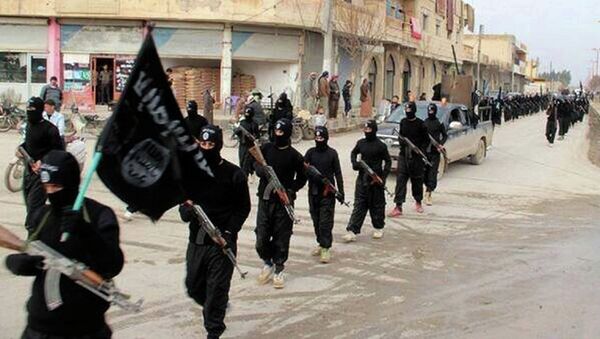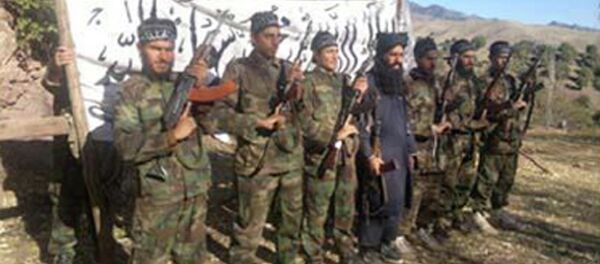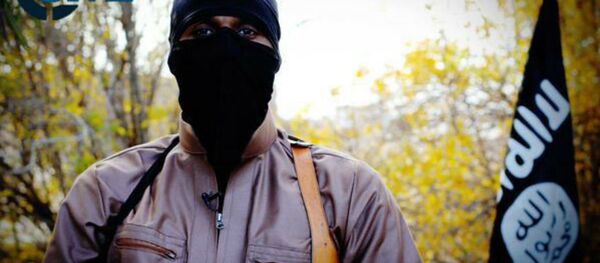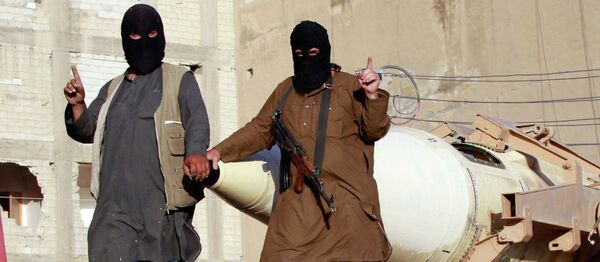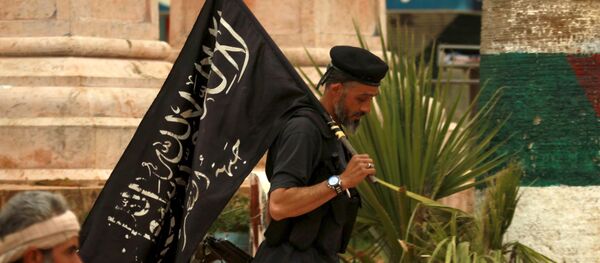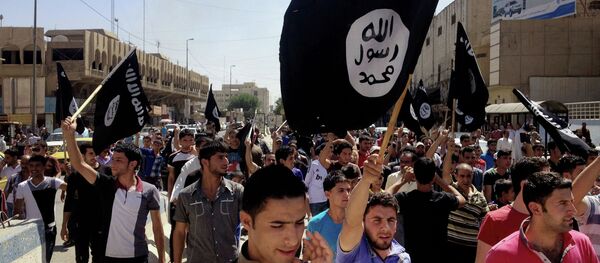A group of Syrian officers and a Turkmenistan national, who is a former ISIL "emir" in charge of training suicide bombers, explained to RIA Novosti how this "death machine" works.
A year ago, Syrian secret services arrested a group of Turkmen citizens who had operated a suicide-bomber training school within the ISIL. The militants were detained at the Turkish border, where they planned to hand over a "flash drive" to their sponsors.
In local parlance, the term "flash drive" stands for videos showing terrorist attacks. The group members, carrying a laptop with the videos, drove up to an army checkpoint and were seized by guards.
"The personnel were most likely alerted by the very fact that the citizens of remote Turkmenistan had come to this area. It turned out that they were staying in Syria illegally, and their passports were not properly stamped. The soldiers searched them and found the laptop and its contents…," a Syrian officer said.
The security services were lucky; they laid their hands on a laptop that provided them with detailed data on the Islamic State's suicide-bomber school.
Suicide-bomber school
Once the laptop is booted up, a welcoming screen appears in Russian. There are numerous folders on the desktop with names like "detonators," "reagent" and "chemistry," also in Russian. The laptop owners had uploaded several hand-written Russian-language manuals on how to become a demolition expert.
Another video shows an unidentified person placing explosives inside a truck. Plastic barrels filled with TNT are carefully inserted. The cameraman films the process in great detail. Wires connect barrels with the driver's cabin, and a red button located near the steering wheel is intended to be the detonator.
Another video shows members of a terrorist "brotherhood" saying goodbye to a suicide bomber. They hug the man, and give him final instructions. The face of the suicide bomber is calm.
"He had obviously been brainwashed for several months," an unidentified secret service officer suggested.
The secret service officer explained that suicide bomber recruits are usually weak-willed people who can be quickly indoctrinated and do not express concern for their own lives or those of other people.
"It's good when the perpetrator is dim-witted and uneducated because he can be easily convinced that beautiful virgins are waiting for him in paradise. Single young men and women between the ages of 16 and 22 are in particular demand. They have no prospects in this life, and a terrorist act is a good chance to quickly enter paradise," the officer said.
During interrogation, the teenage would-be suicide bomber confessed he had become a militant after a sister had been found guilty of adultery. At that time, he decided that his family had been dreadfully dishonored, and only a "heroic feat" could make up for the perceived disgrace.
In another video found on the laptop, "emir" Raushan, a fleshy, confident-looking man, is seen tapping a suicide bomber on the shoulder, possibly in support.
The laptop has many other files but the security officer has seen enough. It's time to bring in Raushan for questioning.
In the interrogation it is clear that Raushan's confidence has ebbed. The former "emir," a confident smiling freedom-fighter in the videos, now sits in a secure cell with his shoulders drooping and a blank, thousand-yard stare on his face. Slowly his answers reveal what brought him to this place.
From cabbie to emir
Several years ago, Raushan, now 35, was a taxicab driver in Ashgabat.
"I didn't earn much, but it was enough to buy us some food. I have a wife and five children," he said.
One of his relatives went to Syria to wage jihad. A few weeks later, the relative called Raushan from Aleppo and said that life was good there. He invited Raushan to Syria, and told him how to get in touch with what he described as "guides."
Raushan accepted his relative's invitation and, his story goes, flew from Ashgabat to Istanbul, which jihadi fighters frequently use as a stopover. In Istanbul he was met by a contact who got him a ticket for a bus to the Hatay province on the Turkish-Syrian border. On the bus, Raushan met other Turkmens and some Uzbeks also traveling to Syria to wage jihad.
In fact, there were no Turkish guards, as militants were in control of the border, he added.
At the militant camp, they told Raushan to study explosives and demolition work with the intention of his becoming a trainer. He suspected his bosses did not think that, being fat, he would make a good field soldier. Recruits from Central Asian republics were taught in Russian because it was a common language.
Raushan eventually set up his own team.
'Innocent victims go to paradise'
In due time, Raushan explains, he brought his family to Syria.
"They gave me a big house in a village near Aleppo. I lived there with my wife and five children, and we got everything we wanted," Raushan recalled.
Now he shares a small prison cell with other inmates.
"I don't know who lived there before, and I never thought about it. They simply gave me that home and said we could live there. That building was unoccupied when we arrived, but it had everything you need for living," Raushan said.
"We stage terrorist attacks before invading in order to scare the military and destroy the infrastructure," he added.
Raushan's team perpetrated several deadly terrorist acts in Aleppo, including attacks on a military hospital, an army base and the front gate of the main city prison.
"Explosions are killing not only Syrian soldiers, who you are fighting against, but also civilians. Don't you feel sorry for them?" an investigator asked Raushan.
"The Quran teaches us that if an innocent civilian dies during the war, he or she will go to paradise," the suicide-bomber coach replied without hesitation.
Officer adopts terrorist's son
Raushan was taking his 3-year-old son Abdullah to what he thought was a meeting with sponsors, but ended up in a Syrian prison instead.
The militants did not expect problems en route, but if there were suspicions, perhaps they thought the boy would help them conceal their identities and actions. After Raushan's arrest the boy was adopted by the family of a Syrian officer.
The officers filmed a video with the child. It shows a bewildered little Abdullah standing on the doorstep of his father's cell, looking timidly at Raushan. The child may not see his father for a long time, or maybe it's the last time. Abdullah may be trying to fix his father's face in his mind, to better remember him. The father stretches his hands toward the boy and weeps.
Will they ever see each other again?

